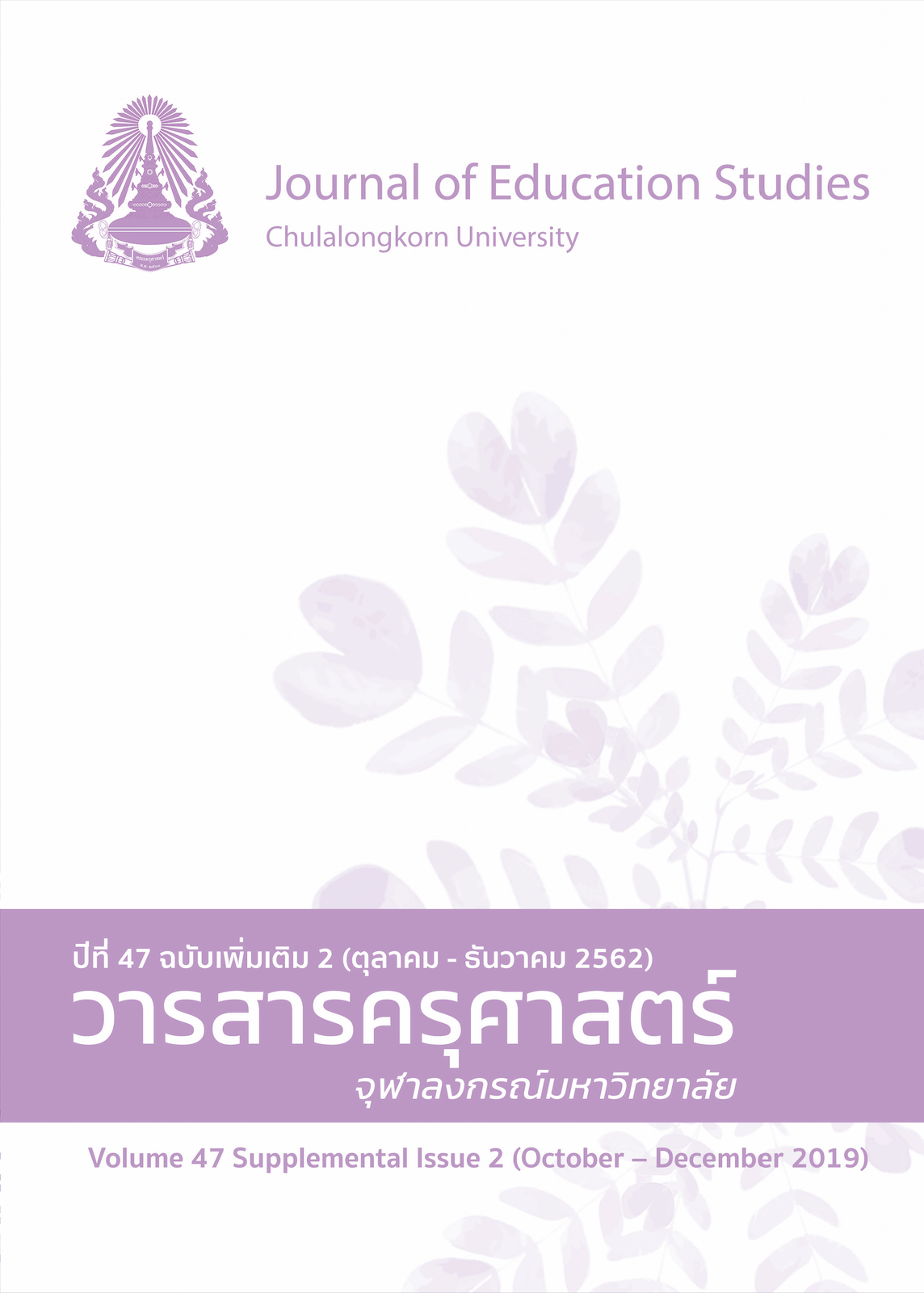An Analysis and Synthesis of Philosophies, Concepts, and Principles of Lifelong Education for Becoming a Learning Community
Keywords:
PHILOSOPHIES, LIFELONG EDUCATION, LEARNING COMMUNITYAbstract
The objectives of this research are to analyze and synthesize the philosophy, the concept, and the principle of lifelong education for learning community, and also, to present the knowledge of the philosophy, the concept, and the principle of lifelong education for learning community. This research was conducted by document analysis and group discussion of lifelong education experts to evaluate information. The findings are: The philosophy of lifelong education for learning community consists of four aspects: 1. The belief in people and community that they have potential. 2. Learning is the change of the better people and community. 3. People and community can learn well when they get what they need. 4. Learning community can solve the difficulties which occur in the community. The concept of lifelong education for learning community consists of four ideas: 1. People and community are able to learn based on their need and interest 2. People can learn by themselves by using their own means and style 3. Learning can happen in anywhere and anytime and there are no boundaries of learning 4. Learning should respond to people’s need and interest and it should not be against the culture of community and society. The principle of lifelong education for learning community is composed of six principles: 1. principles of learning, 2. principles of benefit-based, 3. principles of thinking and action, 4. principles of leadership, 5. principles of communication, and 6. principles of inside community strength.
References
กระทรวงศึกษาธิการ. (ม.ป.ป.). พระราชบัญญัติส่งเสริมการศึกษานอกระบบและการศึกษาตามอัธยาศัย พ.ศ. 2551. สืบค้นจาก http://www.otepc.go.th/otepc06/laws/la051.pdf
เกษม วัฒนชัย. (2549). การจัดการศึกษาเพื่อพัฒนาชีวิตอย่างยั่งยืน. กรุงเทพมหานคร: วิทยาลัยการปกครองท้องถิ่น สถาบันพระปกเกล้า.
ประไพ ศิวะลีราวิลาศ. (2549). การพัฒนารูปแบบการศึกษาโดยใช้ชุมชนเป็นฐานเพื่อพัฒนาทุนทางสังคม(วิทยานิพนธ์ปริญญาดุษฎีบัณฑิต). สืบค้นจาก http://cuir.car.chula.ac.th/handle/123456789/13398
มลิวัลย์ บุญดา และ ศุกลรัตน์ มิ่งสมร. (2552). การวิเคราะห์องค์ประกอบคุณลักษณะการเป็นบุคคลแห่งการเรียนรู้ของครูผู้สอนในสถานศึกษาขั้นพื้นฐาน สังกัดสำนักงานคณะกรรมการการศึกษาขั้นพื้นฐาน (วิทยานิพนธ์ปริญญามหาบัณฑิต ไม่ได้ตีพิมพ์). มหาวิทยาลัยนเรศวร, พิษณุโลก.
วิจารณ์ พานิช. (2548). การจัดการความรู้กับการบริหารราชการไทย. กรุงเทพมหานคร: สถาบันส่งเสริมการจัดการความรู้เพื่อสังคม.
วิบูลย์ศิลป์ พิชยมงคล. (2547). คุณลักษณะการเป็นบุคคลแห่งการเรียนรู้ของนักเรียนสถาบันการอาชีวศึกษา กรุงเทพมหานคร 2 (วิทยานิพนธ์ปริญญามหาบัณฑิต สถาบันเทคโนโลยีพระจอมเกล้าเจ้าคุณทหารลาดกระบัง). สืบค้นจาก http://newtdc.thailis.or.th/docviewaspx?tdcid=327982
สนอง โลหิตวิเศษ. (2544). ปรัชญาการศึกษาผู้ใหญ่และการศึกษานอกระบบ. กรุงเทพมหานคร: ภาควิชาการศึกษาผู้ใหญ่ คณะศึกษาศาสตร์ มหาวิทยาลัยศรีนครินทรวิโรฒ.
สำนักงานคณะกรรมการการศึกษาแห่งชาติ. (2543). รายงานสรุปการสัมมนา ยุทธศาสตร์การเรียนรู้ตลอดชีวิต. กรุงเทพมหานคร: องค์การค้าคุรุสภา.
สำนักงานคณะกรรมการพัฒนาการเศรษฐกิจและสังคมแห่งชาติ. (2555). แผนพัฒนาเศรษฐกิจและสังคมแห่งชาติ ฉบับที่ 11 (พ.ศ. 2555-2559). กรุงเทพมหานคร: สำนักงานคณะกรรมการพัฒนาการเศรษฐกิจและสังคมแห่งชาติ.
สำนักงานเลขาธิการสภาการศึกษา. (2547). นครแห่งการเรียนรู้. กรุงเทพมหานคร: ภาพพิมพ์.
สำนักงานเลขาธิการสภาการศึกษา. (2548). สังคมแห่งการเรียนรู้ต้นแบบ 5 ภูมิภาค รุ่น 1. กรุงเทพมหานคร: ชุมชนสหกรณ์การเกษตรแห่งประเทศไทย.
สำนักงานเลขาธิการสภาการศึกษา. (2551). รายงานการวิจัยวิธีวิทยาการประเมินความสำเร็จของการศึกษาเพื่อเสริมสร้างสังคมแห่งการเรียนรู้. กรุงเทพมหานคร: เพลิน สตูดิโอ.
สุมาลี สังข์ศรี. (2545). การจัดการศึกษานอกระบบด้วยวิธีการศึกษาทางไกลเพื่อการศึกษาตลอดชีวิต. นนทบุรี: มหาวิทยาลัยสุโขทัยธรรมาธิราช.
สุดสาคร จันทะล่าม. (2550). พฤติกรรมการเป็นบุคคลแห่งการเรียนรู้ของครูโรงเรียนราชประชานุเคราะห์ จังหวัดเชียงใหม่ (วิทยานิพนธ์ปริญญามหาบัณฑิต). สืบค้นจาก http://cmuir.cmu.ac.th/jspui/handle/6653943832/12424
อาชัญญา รัตนอุบล. (2551). แนวทางการพัฒนาการดำเนินการยกย่องครูภูมิปัญญาไทยในการจัดการเรียนรู้เพื่อพัฒนาการศึกษา เศรษฐกิจ และสังคมในท้องถิ่นอย่างครบวงจร (รายงานผลการวิจัย). กรุงเทพมหานคร: สำนักเลขาธิการสภาการศึกษา.
ภาษาอังกฤษ
Coffield, F. (2000). Differing visions of a learning society research findings. Volume 1. Bristol: Policy Press.
Edwards, R. (1997). Changing places? Flexibility, lifelong learning, and a learning society. New York: Routledge.




